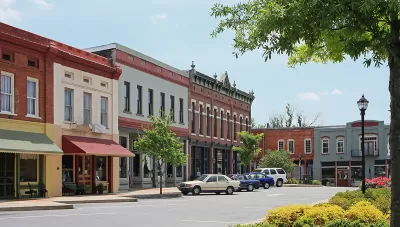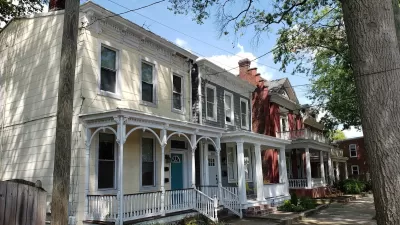Joe Minicozzi of Urban3 recently got national media attention from Forbes. The article describes Minicozzi as a kind of evangelist, making a strong, rational case for cities of all sizes to invest in their downtowns instead of big box retail.

In a recent Forbes "BrandVoice" article, Darren Dahl writes of the work of Joe Minicozzi of Urban3, who “travels around the country to encourage municipalities to see that their downtowns, no matter how neglected, often contribute far more value in terms of tax revenue — property and sales tax combined — than even the biggest big-box store.”
Dahl explains the downside of the typically short-sighted considerations of cities when they approve suburban forms of development: “most communities unintentionally subsidize suburban development because they don’t calculate the true cost of expanding infrastructure like water and sewage, and services like police and fire to the fringes of a community’s corporate boundary.”
Urban3’s analysis has already made the case for the tax-generating efficiencies of downtown mixed-use development in cities like Asheville, North Carolina, Glenwood Meadows, Colorado, and Providence, Rhode Island. The Forbes article, however, provides a national stage for Urban3’s appeal for more comprehensive reviews of developments and their impacts on public concerns like infrastructure and tax revenue.
FULL STORY: Why Downtown Development May Be More Affordable Than The Suburbs

Maui's Vacation Rental Debate Turns Ugly
Verbal attacks, misinformation campaigns and fistfights plague a high-stakes debate to convert thousands of vacation rentals into long-term housing.

Planetizen Federal Action Tracker
A weekly monitor of how Trump’s orders and actions are impacting planners and planning in America.

In Urban Planning, AI Prompting Could be the New Design Thinking
Creativity has long been key to great urban design. What if we see AI as our new creative partner?

King County Supportive Housing Program Offers Hope for Unhoused Residents
The county is taking a ‘Housing First’ approach that prioritizes getting people into housing, then offering wraparound supportive services.

Researchers Use AI to Get Clearer Picture of US Housing
Analysts are using artificial intelligence to supercharge their research by allowing them to comb through data faster. Though these AI tools can be error prone, they save time and housing researchers are optimistic about the future.

Making Shared Micromobility More Inclusive
Cities and shared mobility system operators can do more to include people with disabilities in planning and operations, per a new report.
Urban Design for Planners 1: Software Tools
This six-course series explores essential urban design concepts using open source software and equips planners with the tools they need to participate fully in the urban design process.
Planning for Universal Design
Learn the tools for implementing Universal Design in planning regulations.
planning NEXT
Appalachian Highlands Housing Partners
Gallatin County Department of Planning & Community Development
Mpact (founded as Rail~Volution)
City of Camden Redevelopment Agency
City of Astoria
City of Portland
City of Laramie





























